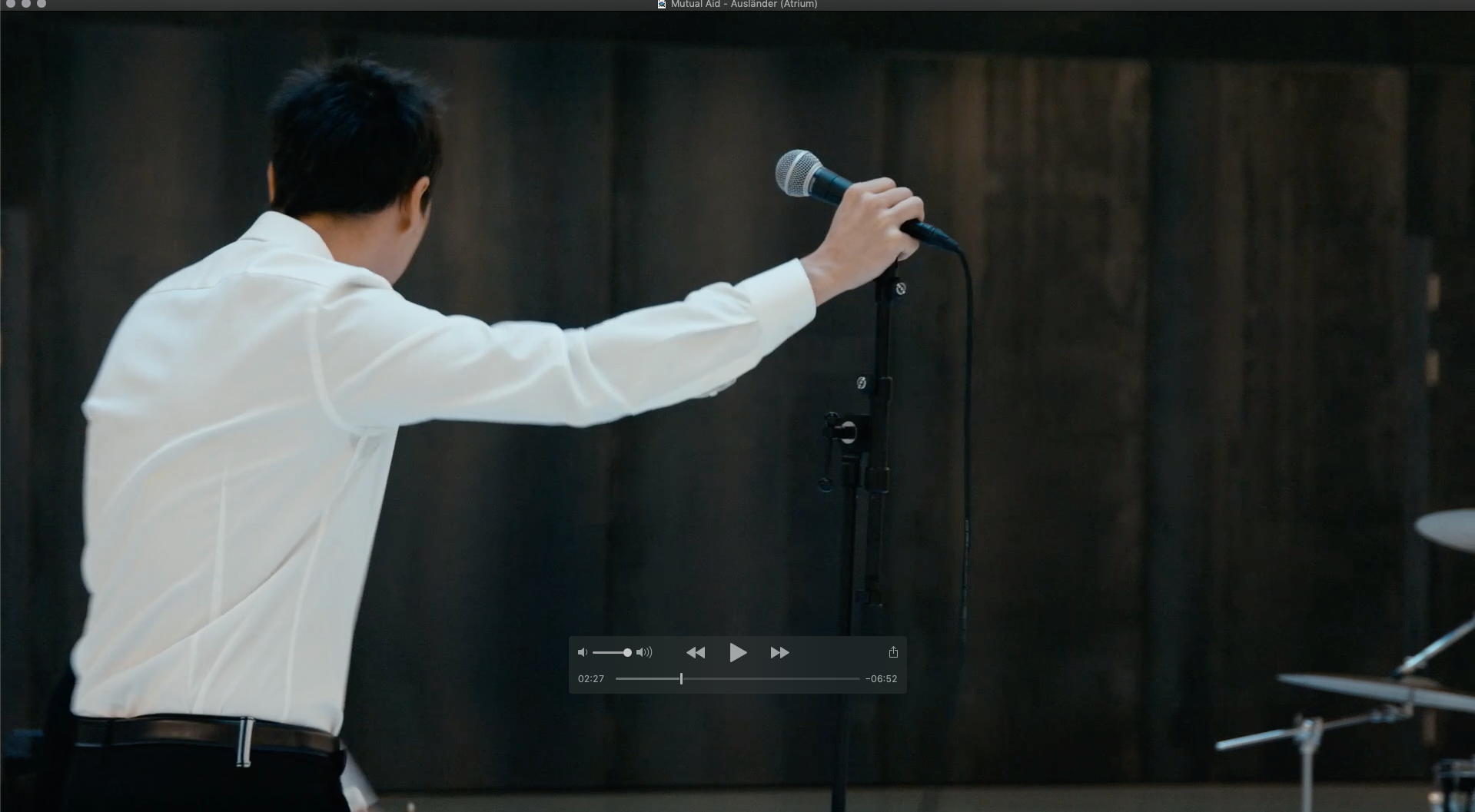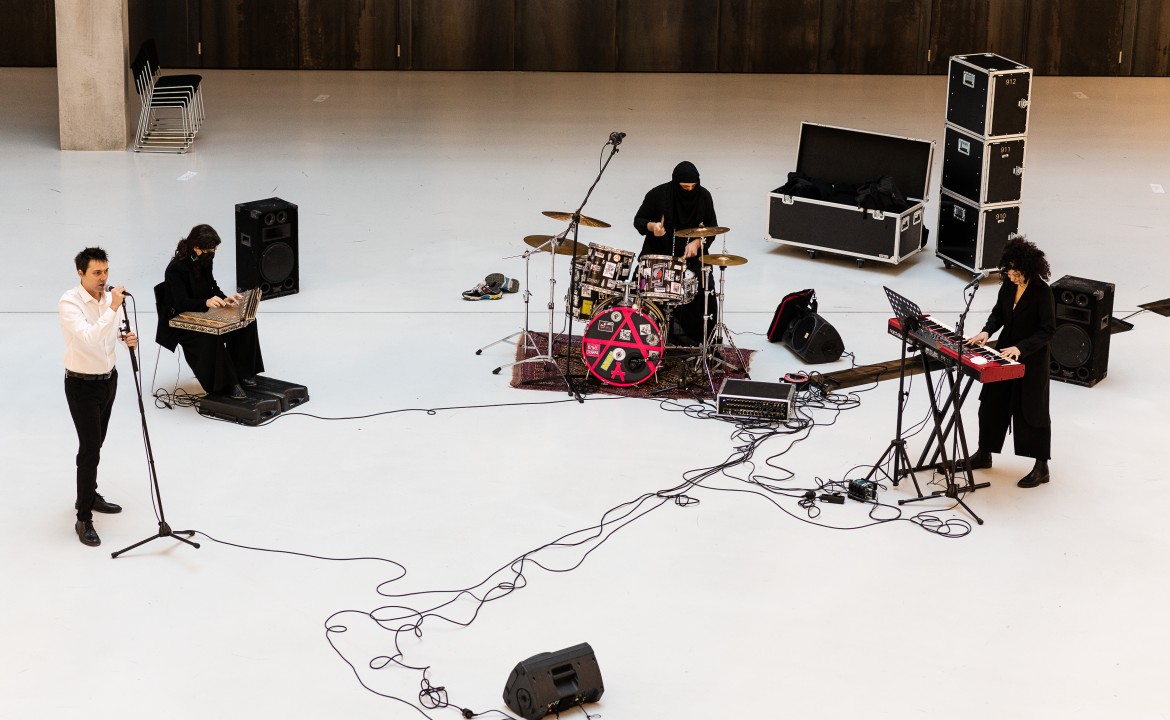The musical part consisted of compositions, Europe memento mori and Cannibal, integrated as one piece performed by Ausländer band.
Video of the performance:

Mentor Sen. Lect. Dr. Bernd Kräftner
“Mutual aid in self-organized societies” is five years of research work conducted within socially engaged art practice accumulated
in a theoretical written publication. Diploma work was presented as music performance relaying on discussed topics of anarchism
and mutual aid and its meaning in the present reality. The music performance in quasi punk- opera genre was presented by the
collective Ausländer on the 20th of January 2020 in the Atrium at the University of Applied Arts Vienna.
Thesis content
Based on the research work, Marko Marković considers questions of social behaviours of collectives and individuals, its functionality
and non - functionality by relaying to the concept of Mutual Aid. Considering examples of self-organized/ non - governed societies
with autonomous methodologies as tactics of survival, solidarity, and self-sustainability. Markovic talks from the personal
experience of non-aesthetic artistic presentations then rather social strategies used as an impact on the public space with
performance, activism, community-based work, music, and direct action.
Referring to the philosophical directions of the anarchistic school of thought, Marković emphasizes the meaning of Mutual
Aid in social movements from 19 century till today. His research questions are focused on pragmatic solutions and reflections
on self-organized societies in the time of the “new reality “. Witnessing and experiencing power position through the history
of the civilization as authoritarian creation of class divisions among nations, races, genders incorporated with systematic
violence and permanent completion. I think of the new models of social behaviour in the service of an egalitarian society.
Based on this motion, Marković considers the concept of mutual aid as collective cooperative behaviour among species in extreme
life conditions compared with the evolutionary theory of natural selection. In such a theory Peter Kropotkin argues Darwin’s
theory of evolution explaining that cooperation and coexistence are the strongest links in the evolution of a species and
not the law of “survival of the fittest”.
Darwin’s model of evolution theory was created on fundamentals of economy written by rich white European man, highly positioned
in powerful colonial empire. Such worldwide influences historically and systematically were creating civilization based on
class, race, nation, gender and privileged - nonprivileged society divisions. On the other hand, it is interesting to
compare scientific research based on biology and sociology, by Peter Kropotkin who deals with the ethics of cooperation.
Mutual aid talks about the instinct and relationship among species – humans and animals – within extreme natural conditions
supporting each other to survive. Even though they come from different “tribes” and different “food chain” positions, they
help each other by providing mutual aid in terms of protection, food, and shelter. Putting on the side position of superiority
and inferiority as stronger towards the weaker in the food chain. Mutualism is everywhere around us. It is the primary behaviour
among species in nature. Relationship and bond between two or more parties with mutual benefits in the cooperative system
in life coexistence.
Mutualism is a relationship among humans that upholds the idea of mutual understanding between individual and collective parties
within models of communal work as a product distribution in exchange for labour production. Exchange of goods was the dominant
trading economy in non-monetary societies self-organized on the scale of the local units. Mutualism among people considers
respectful relationships in creating correct working conditions in terms of invested labour and product production. Observing
nature made laws and man-made laws how can we consider individual and collective social anarchism?
Within the publication text, Markovićis presenting the concept of collective Ausländer as one of the action tactics. Ausländer
came out much more as a model of social activity among people with the same or similar understanding regarding society and
music as a tool of communication than as a result of the usual musician-band format. Ausländer upholds the idea of a collective,
based on a philosophy of anarchism as mutualism and the principle of associated communal work as well as the distribution
of activities, the examination of power positions and decision making, and the exchange of skills, experience, and knowledge.
As such, Ausländer’s expression comes in the fields of music, poetry, theory, film, performance, and social engagement.
“Ausländer” (a stranger, a sojourner) is used as a deceitful and vulgar term for a person who is not desirable and does not
belong to the particular country or nation in which she or he is residing. According to such connotations, Ausländer’s project
has gathered up people from all over the world who confront such hate speech by supporting the humanistic values of mutualism,
libertarianism, equality, and social justice. That is exactly why we use “Ausländer,” a word with a negative connotation,
and interpret it conceptually, giving it a meaning with a positive and creative explanation. By doing so, we consider Ausländer
as a semantic change in linguistic reappropriation (resignification) in personal and socio-political self-empowerment.
Performance content
Appearance on the stage followed the loud sound breaking the silence - it was a call for people to come together. The situation
was constructed in the cause of events as the audience got integrated into performance rounding up the meaning of the presentation
concept and the idea of unity.
The band played music but the whole ambient was created by people coming from all over the building spontaneously filling
the atrium space as a big stage with all of us performing together. Diploma students gathered with their professors, university
staff members started to come from their offices, cleaning ladies stopped with the duties, technicians became a part of the
band. It was a act of mutual aid connecting us in time and space.
The music performance consisted of two compositions Europe memento mori and Cannibal integrated as one musical piece with
the lineup of the narrative vocal by Marko Marković, Kasho Chualan on electro synthesizer and back vocal, Quanun by Sofia
Labropoulou and drums by Mikal Maldoror.
Europe Mento Mori is a deconstructed language construct of BKS, Russian, English, German, Italian and Latin language. The
content of the song talks about Eurocentric politics and the legacy of social norms discussed in the thesis topic. The dystopian
atmosphere in the theme appropriates historical interpretations of death and recollection of human mortality - Memento mori.
Cannibalistic appearance in the second act of the music performance shows the chaotic, uncontrolled presentation of (self)
destructive human dominance performed in the vanguard, grotesque grindcore expression.
Ausländer music performance link
https://www.youtube.com/watch?v=kOxLILRhtUE
Ausländer band camp
https://auslaenderband.bandcamp.com/
Commission
Sen.Lect. Dr. Bernd Kräftner
Mutual Aid in Self-Organized Societies
> Marko Markovic, 2021> Marko Markovic, 2021> Marko Markovic, 2021> Marko Markovic, 2021Marko Markovic. Photos © Jorit AustFact Box
-
Alumni
- Marko Markovic (Master Project Presentation)

